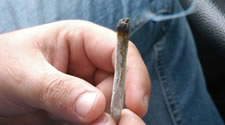 The results of a national survey on drug use and health were issued Sept. 15 by the federal government, noting a surge in the use of marijuana and other drugs such as ecstasy and methamphetamine. The Substance Abuse and Mental Health Services Administration (SAMHSA) of the US Department of Health and Human Services publishes the annual study, which is often used by the "drug czar" to highlight the status of the so-called "War on Drugs." Although the government claims that prescription drug abuse is its highest priority, the White House Office of National Drug Control Policy (ONDCP) took the opportunity to rail against medical marijuana use.
The results of a national survey on drug use and health were issued Sept. 15 by the federal government, noting a surge in the use of marijuana and other drugs such as ecstasy and methamphetamine. The Substance Abuse and Mental Health Services Administration (SAMHSA) of the US Department of Health and Human Services publishes the annual study, which is often used by the "drug czar" to highlight the status of the so-called "War on Drugs." Although the government claims that prescription drug abuse is its highest priority, the White House Office of National Drug Control Policy (ONDCP) took the opportunity to rail against medical marijuana use.
Gil Kerlikowske, head of the ONDCP, used the study to argue in mainstream media outlets that marijuana "is not medicine," claiming that the issue of medical marijuana sends "mixed messages" to youth. "I think all of the attention and the focus of calling marijuana medicine has sent the absolute wrong message to our young people," Kerlikowske said to the Associated Press the day the report was released. Kerlikowske also called marijuana "an entry drug" and blamed it for the overall increase in illegal drug use cited in the study.
"The drug czar should not be using an increase in drug abuse to attack medical marijuana or to scapegoat patients," said Caren Woodson, director of dovernment affairs at Americans for Safe Access, the country's leading medical marijuana advocacy group. "At the same time we've been adopting medical marijuana laws in the U.S., marijuana use by young people has actually decreased, contradicting the government's main argument." According to its own study, SAMHSA indicated that the rate of marijuana use among youths aged 12 to 17 decreased from 8.2% in 2002 to 7.3% in 2009.
"The Obama Administration may oppose marijuana use," continued Woodson. "But, it's very disingenuous to claim that medical marijuana is responsible for an increase in marijuana abuse or that it has fueled an increase in illegal drug abuse overall." A study published in the September issue of the Journal of Health and Social Behavior cast doubt on the argument that marijuana is a "gateway drug," citing ethnicity, stress and unemployment as more relevant factors in predicting whether young adults will use other illegal drugs. Also, a previous study conducted by researchers at the University of Buffalo, recently published in the Journal of Addiction Medicine, found that people often first get addicted to drugs while using prescription painkillers.
In states that have legalized medical marijuana, the number of qualified patients is commonly far lower than 1% of the population. "Greater numbers of patients using marijuana to treat their medical condition is a tremendous success story," said Woodson. "Yet, those numbers are nowhere near significant enough to influence, let alone encourage, marijuana use by the remaining ninety-nine percent of the population." (ASA, Sept. 17)
Photo by prensa420







Recent comments
3 weeks 6 days ago
4 weeks 2 hours ago
7 weeks 19 hours ago
8 weeks 2 hours ago
12 weeks 9 hours ago
15 weeks 5 days ago
19 weeks 6 days ago
20 weeks 4 days ago
30 weeks 4 days ago
34 weeks 4 days ago